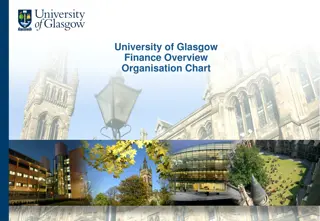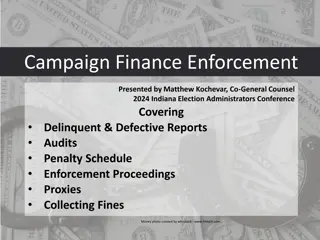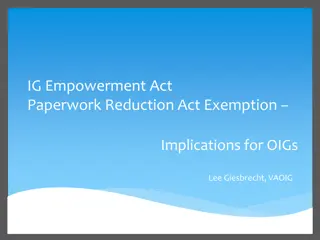Overview of Finance Act 2019 and Its Business Implications
The Finance Act 2019, signed into law in January 2020, aims to promote fiscal equity, align tax laws with global practices, introduce tax incentives, support small businesses, and raise revenue. It made significant changes to tax laws affecting companies, VAT, personal income tax, capital gains tax, and customs. The Act brings implications such as mandatory Tax Identification Numbers, expanded taxation criteria for non-resident companies, exemption on profits from exports, and more.
Download Presentation

Please find below an Image/Link to download the presentation.
The content on the website is provided AS IS for your information and personal use only. It may not be sold, licensed, or shared on other websites without obtaining consent from the author. Download presentation by click this link. If you encounter any issues during the download, it is possible that the publisher has removed the file from their server.
E N D
Presentation Transcript
10TH DETAIL BUSINESS SERIES FINANCE ACT 2019: IMPACT ON BUSINESS 13TH FEBRUARY 2020 Chukwudi Ofili Associate Partner, DETAIL Commercial Solicitors Anthony Ezeamama Senior Associate, DETAIL Commercial Solicitors 1 D e t a i l C o m m e rc i a l S o l i c i to r s
Overview of the Finance Act, 2019 Implications of Changes made to CITA Implications of Changes made to PITA Implications of Changes made to the VAT Act Implications of Changes made to the CGT Act OUTLINE Implications of Changes made to the Customs, Excise Tariff, Etc. (Consolidation) Act Implications of Changes made to the Stamp Duties Act Sectorial Analysis of the Finance Act, 2019 Questions
Overview of the Finance Act, 2019 __________________________________________________ Signed into law by the President on 13th January 2020 and commenced on the same date. Objectives of the Finance Act: a) Promote fiscal equity by mitigating instances of regressive taxation; The Finance Act made sweeping changes to the provisions of the: b) Reform domestic tax laws to align with global best practices; a) Companies Income Tax Act ( CITA ); b) Value Added Tax Act ( VATAct ); c) Petroleum Profit Tax Act ( PPTA ); d) Stamp Duties Act, Personal Income Tax Act ( PITA ); e) Capital Gains Tax Act ( CGTAct ); and f) Customs, Excise Tariff, Etc. (Consolidation) Act. c) Introduce tax incentives for investments in infrastructure and capital markets; d) Support small businesses in line with the ongoing ease of doing business reforms; and e) Raise revenue for government. D e t a i l C o m m e rc i a l S o l i c i to r s 3
Implications of Changes Made to CITA _____________________________________________________________________________ Tax Identification Number (TIN) - now statutorily required to operate an account in Nigeria and to be quoted in all business transactions and documents by the taxable company. Non-resident Companies - The basis of taxation of non-resident companies expanded. technical, management, consultancy or professional services from offshore locations to persons in Nigeria significant economic presence in Nigeria as determined by the Finance Minister. Excessive Dividend Tax - now expunged from CITA. Accordingly, dividends paid out from retained earnings that have suffered tax will no longer be subject to further tax. Agricultural Companies - initial tax-free period of 5 years renewable for an additional maximum period of 3 years upon satisfactory performance of the agricultural production. D e t a i l C o m m e rc i a l S o l i c i to r s 4
Implications of Changes Made to CITA _____________________________________________________________________________ Exemption on Profits from Export - The profits of a Nigerian company in respect of goods exported from Nigeria are now tax exempt. Note: the proceeds of such exports must be used for the purchase of raw materials, plant equipment and spare parts. Otherwise, tax will apply proportionately on the portion of such proceeds which are not utilised in the manner prescribed. Non-deductibles the Finance Act now includes new categories that cannot be deducted for the purpose of calculating tax liability. D e t a i l C o m m e rc i a l S o l i c i to r s 5
Implications of Changes Made to CITA _____________________________________________________________________________ Commencement and cessation rules Now deleted. The basis for taxation now aligns with the accounting period of the affected company. Carrying Forward Losses - The restriction on carrying forward losses has been deleted. Companies can carry forward losses indefinitely. Related Party Business Reorganisations - now exempted from VAT, CGT and certain CITA rules. Note: (i) the parties must have been connected for a consecutive period of at least 365 days prior to the date of reorganization and (ii) there will not be any subsequent disposal of the acquired assets by the Nigerian entity within 365 days after the date of the transaction. Minimum Tax - now 0.5% of gross turnover of companies. Small companies have been included amongst the entities exempted from minimum tax. Companies with at least 25% imported equity capital have been deleted from the exemption list. D e t a i l C o m m e rc i a l S o l i c i to r s 6
Implications of Changes Made to CITA & PITA _____________________________________________________________________________ Rate of CIT CIT is now payable on or before the time of filing tax returns and no longer within 2 months of the filing date unless installment payment is agreed with the FIRS. A Small Company - earns gross turnover of N25,000,000 or less, pays CIT at the rate of 0%; Early payment (i.e. 90 days before the due date): medium-sized companies will get 2% bonus on the tax paid large companies will get 1% bonus. The bonus is available as tax credit A Medium-sized Company - earns gross turnover greater than N25,000,000 N100,000,000, pays CIT at the rate of 20%; but less than A Large Company - not a Small or Medium-sized Company, pays CIT at the rate of 30%. Notice of Objection can be delivered in person, by courier service or via electronic mail. D e t a i l C o m m e rc i a l S o l i c i to r s 7
Implications of Changes Made to the VAT Act _____________________________________________________________________________ Notice of cessation of business must be given to FIRS within 90 days of such cessation of business. VAT rate now 7.5%. The rate became effective as at 1st February 2020. Registration with FIRS - Taxable persons to register with FIRS for VAT upon commencement of business. Default attracts N50,000 for first month of default and N25,000 for subsequent months of default. Supply of Goods - Section 2 of the VAT Act has been amended to provide clarity on when goods and services shall be deemed to be supplied in Nigeria for VAT purposes. D e t a i l C o m m e rc i a l S o l i c i to r s 8
Implications of Changes Made to the VAT Act _____________________________________________________________________________ Where the Threshold has not been established, a taxable person will be exempt from the following obligations under the VAT Act: Recipients of services from non-residents are to self account for VAT irrespective of whether the non-resident issued a tax invoice. Businesses with transactions N25,000,000 and above in value (the Threshold ) to collect VAT, remit and render VAT returns. a) Requirement to register for VAT with the FIRS; b) Requirement to issue a tax invoice to its contracting counterpart and the attendant penalty for failure to issue a tax invoice; c) Requirement to collect VAT (where applicable); and d) Filing of monthly VAT returns. D e t a i l C o m m e rc i a l S o l i c i to r s 9
Implications of Changes Made to the VAT Act _____________________________________________________________________________ Failure to render VAT returns to FIRS - attracts increased penalty of N50,000 for the first month and N25,000 for each subsequent month. Excess input VAT can now be utilised as tax credit in subsequent months or is to be refunded by FIRS upon provision of such documents as FIRS may require. Definitions of Goods has now been expanded to include: a) tangible properties movable at the point of supply, but does not include money securities; and Failure to remit VAT to the FIRS now attracts increased penalty: 10% of the tax not remitted. Interest at the prevailing Central Bank of Nigeria minimum re-discount rate will also be added to the tax. that are or Failure of a taxable person to notify FIRS of a change in address or a permanent cessation of trade - attracts penalty in the sum of N50,000 for the first month and N25,000 for each subsequent month. a) intangible products, assets or properties over which a person has ownership or rights, or which he derives benefits, and which can be transferred from one person to another excluding interest in land. from D e t a i l C o m m e rc i a l S o l i c i to r s 10
Implications of Changes Made to the VAT Act _____________________________________________________________________________ Basic Food Items - The terms basic food items as used in the VAT exemption list has now been given a definite and expanded meaning. Food items that qualify as basic food items are generally agro and aqua based staple food that are in raw and semi finished forms. Exported Service - The Finance Act now qualifies the definition of exported service such that service rendered to a non-resident with a fixed base in Nigeria will not qualify as exported services. The exempted goods and services in Part I and II of the First Schedule to the VAT Act now expanded and reviewed to include: (i) Locally manufactured sanitary towels, pads or tampons, (ii) Services rendered by micro finance banks, mortgage institutions; and (iii) Tuition relating to nursey, primary and secondary tertiary education. D e t a i l C o m m e rc i a l S o l i c i to r s 11
Implications of Changes Made to the Customs, Excise Tariff, Etc. (Consolidation) Act _____________________________________________________________________________ Section 21 of the Customs Tariff Act has been amended such that all goods manufactured and imported into Nigeria shall be subject to excise duty. However, excise duty shall not be paid on goods that are: (i) not locally produced in Nigeria; and (ii) any raw materials that are not locally available in Nigeria. D e t a i l C o m m e rc i a l S o l i c i to r s 12
Implications of Changes Made to the Stamp Duties Act _____________________________________________________________________________ .. The terms stamp and stamped defined to include electronic stamp and electronic stamping. Instruments that are required to be stamped under the Stamp Duties Act have been defined to include electronic documents. Competent government authorities to collect stamp duties clearly named as FIRS and the relevant State tax authorities. Electronic receipts or electronic bank transfers on amount from N10,000 and above will attract stamp duty of a singular and one-off duty of N50. However, transfers between the same owner s accounts in the same bank are exempted from stamp duty. D e t a i l C o m m e rc i a l S o l i c i to r s 13
Sectorial Analysis of the Finance Act, 2019 D e t a i l C o m m e rc i a l S o l i c i to r s 14
Energy and Utilities Sector _____________________________________________________________________________ The incentives granted to companies that are engaged in gas utilisation in the downstream have been amended as follows: Any dividend distributed by upstream oil companies from petroleum profits will now attract 10% WHT. Based on the new definition of goods in the VAT Act as amended by the Finance Act, electricity should qualify as goods under the VAT Act. Accordingly, any person that purchases electricity for resale (e.g. NBET distribution franchisees) will be entitled to recover their input VAT . The qualifying company cannot claim the gas utilisation incentives and Pioneer Status Incentive on the same qualifying capital expenditure; and and electricity Interest payable on loans that are obtained with the prior approval of the Finance Minister for a gas project will no longer be tax deductibility. D e t a i l C o m m e rc i a l S o l i c i to r s 15
Digital and Electronic Services _____________________________________________________________________________ The basis for taxation of non-resident companies has been expanded. Digital services companies without physical presence in Nigeria but have significant economic presence in Nigeria as defined by the Finance Minister will now be taxed. WHT on such transaction provided by such non-resident company is the final tax on the income of the non-resident receipt. Provided that such person is not caught up by other provisions of section 13(2) of CITA that deals with non-resident taxation. D e t a i l C o m m e rc i a l S o l i c i to r s 16
Real Estate Investment Companies (REIC) _____________________________________________________________________________ The dividend and rental income received by a REIC on behalf of its shareholders are tax exempt. Dividends or mandatory distributions made by a REIC approved by SEC, to its shareholders are tax deductible. Note - a minimum of 75% of dividend and rental income must be distributed within 12 months of the end of the financial year in which the dividend or rental income was earned. Withholding tax provisions on dividend do not apply to any person/company making distribution or dividend payments to a REIC However, a REIC is not exempted from withholding tax on distributes to its shareholders The dividends paid to shareholders from income received by the REIC will not be tax-exempt. the dividends it Also, REIC is not exempted from tax on management fee, profits or any other income earned for and on its own account. D e t a i l C o m m e rc i a l S o l i c i to r s 17
Banking & Capital Markets _____________________________________________________________________________ The scope of interests and dividends have now been expanded to include payments received by a borrower or lender in a Regulated Securities Lending Transaction ( RSLT ). The Finance Act also introduces a proviso to exclude a RSLT from the scope of disposal of money market instruments. Compensating payments/dividends received by a lender from its approved agent or a borrower in a RSLT are tax exempt. Such payments are deemed to be franked investment income and not subject to further tax in the hands of the Lender. Also the compensating payments that qualify as dividends or interest, received by an approved agent from a borrower or lender on behalf of a lender or borrower in a RSLT are tax exempt. D e t a i l C o m m e rc i a l S o l i c i to r s 18
Banking & Capital Markets _____________________________________________________________________________ Dividends distributed by Unit Trusts are tax exempt. Compensating payments/interests made by a lender to its approved agent or a borrower in a RSLT are tax deductible. Compensating payment that qualifies as a dividend made by a borrower to its approved agent in a RSLT are not tax deductible. Compensating payment that qualifies as a dividend or interest made by an approved agent to a borrower or lender in a RSLT are not tax deductible. Withholding tax provisions on interest do not apply to a lender when making compensating payments to an approved agent that is due to a borrower in a RSLT. Note - the approved agent is not exempted from WHT obligations when making the same payments to the borrower. Furthermore, a lender is not exempted from deducting tax when making the payments directly to the borrower. D e t a i l C o m m e rc i a l S o l i c i to r s 19
Banking & Capital Markets _____________________________________________________________________________ Interest on foreign loans no longer qualifies for 100% tax exemption. The maximum exemption now 70% as follows: Repayment period Grace Period including Moratorium Exemption (%) Above 7 years Not less than 2 years 70 5 to 7 years Not less than 18 months 40 2 to 4 years Not less than 12 months 10 Below 2 years Nil Nil D e t a i l C o m m e rc i a l S o l i c i to r s 20
Banking & Capital Markets _____________________________________________________________________________ Stamp Duties Receipts given by any person in a RSLT carried out under regulation issued by SEC are exempted from stamp duties. Introduction of Thin Capitalisation Rules interest on foreign loans payable to connected foreign allowable deduction in computing CIT liability where such interest is in excess of 30% of earnings before interest, taxes, depreciation and ( EBITDA ). lenders will be Shares or securities transferred by a lender to its approved agent or a borrower in a RSLT are exempted from stamp duties. amortisation Also, shares, stocks or securities returned to a lender or its approved agent by a borrower in pursuant to a RSLT are stamp duty exempt. The expenditure not deductible that year will be carried forward to the following assessment year. outstanding 70% interest All documents relating to a RSLTs carried out under regulations issued by SEC are exempted from stamp duties. Does not apply to a Nigerian subsidiary of a foreign company which is engaged in the business of banking or insurance. D e t a i l C o m m e rc i a l S o l i c i to r s 21























